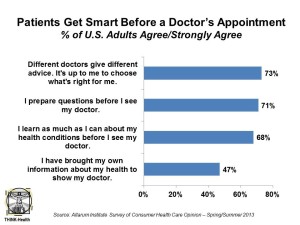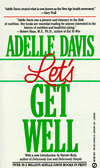 Most Americans are concerned about their ability to for medical bills, even when they have health insurance. As a result, most are comfortable asking their doctor about how much their medical treatment will cost. People are becoming savvier health care shoppers largely because they have to: 37% of people in the U.S. have an annual health insurance deductible over $2,000, according to the Spring/Summer 2013 Altarum Institute Survey of Consumer Health Care Opinion, published on 11th July 2013.
Most Americans are concerned about their ability to for medical bills, even when they have health insurance. As a result, most are comfortable asking their doctor about how much their medical treatment will cost. People are becoming savvier health care shoppers largely because they have to: 37% of people in the U.S. have an annual health insurance deductible over $2,000, according to the Spring/Summer 2013 Altarum Institute Survey of Consumer Health Care Opinion, published on 11th July 2013.
Many of the media stories coming out of the Altarum survey since its publication have been about people and their trust in doctors – or lack thereof.
But the other side of this coin is growing patient/consumer health empowerment.
It appears that people feel competent to take on a greater role in shared decision making, self-diagnosis or assessment of symptoms, and information collecting on conditions – even before seeing the doctor. Take a look at the table, which illustrates that most do “health homework” before going to see their doctor.
Altarum polled a survey sample of 2,357 U.S. consumers in May, 2013.
 Health Populi’s Hot Points: The internet has truly become a go-to source for people and their health, every day. I grew up with a thick tome of a health guide on my parents’ living room bookshelf – I remember a dog-eared Mayo Clinic Guide to Health, as well as a Merck Manual my mom picked up from a library sale in the early 1970s and her nutrition bible, Adelle Davis’ Let’s Get Well.
Health Populi’s Hot Points: The internet has truly become a go-to source for people and their health, every day. I grew up with a thick tome of a health guide on my parents’ living room bookshelf – I remember a dog-eared Mayo Clinic Guide to Health, as well as a Merck Manual my mom picked up from a library sale in the early 1970s and her nutrition bible, Adelle Davis’ Let’s Get Well.
Today’s 5-inch-thick guide to health isn’t a book at all; it’s WebMD, NIH.gov, FDA.gov, Yahoo! health groups, WEGO Health, PatientsLikeMe, CureTogether, DiabetesMine, TuDiabetes, Migraine.com – and to be sure, Paging Dr. Google. And, it’s also friends and neighbors, whose opinions 75% of Americans trust to choose a doctor – more than online rates on a doc’s bedside manner, office waiting times, or objective information on clinical quality, according to Altarum’s poll.
What Altarum finds is that people are preparing in advance of their doctor’s appointments – preparing questions, which means spending time thinking through symptoms, family histories, observations of daily living, and other factors that may feed into an acute situation or a question about how to stay well, fit, and out of the health system.
Statements like “When I work to improve my health, I succeed,” and “I’m generally able to accomplish goals for my health,” garnering 71% agreement from people, demonstrate that folks really believe they are making a difference, and can make a difference, in their health status. That is what we call self-efficacy: confidence and competence to self-care and be effective in doing so.
That 87% of people say they take an active role in their own healthcare, and 90% say they’re comfortable talking to their doctor about their health, belie other more objective stats and epidemiological artifacts: that obesity rates are up, it’s still hard to quit smoking, and people don’t stick to prescribed medication instructions. So there is a gap between reality and self-image when it comes to health outcomes and self-discipline.
Still, the meta-finding from Altarum’s poll is that American adults feel health-savvy and -competent — which is a step up off of the couch toward greater health engagement. One step at a time on the Fitbit; one calorie at a time in nutrition; one positive thought on the mood front. In 2013, the needle is moving in the positive direction for self-care and patient empowerment.




 Thanks to Feedspot for naming this blog, Health Populi, as a
Thanks to Feedspot for naming this blog, Health Populi, as a